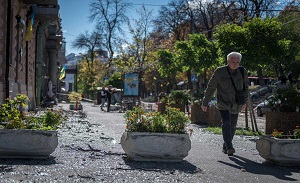Ukraine: Lutherans in Kyiv help people in need

St Catherine’s congregation hands out food and other relief goods
(LWI) - As Russian missiles continue to rain on cities in Ukraine, local churches do what they can to support those affected by the war. On a hilltop in the Kyiv city center sits the Church of Saint Catherine, home to a Lutheran congregation tracing back to the late 1700s, and today gathering some 350 members.
The congregation, one of 18 of the German Evangelical Lutheran Church of Ukraine (GELCU) – an LWF member church since June 2022 – is one that bears witness to the pain caused by the Russian invasion of Ukraine, and who is hard at work supporting people in need.
"The war has brought the community together”
When Russia started shelling the city again, the missiles also hit a storage facility for humanitarian aid provided to GELCU by another LWF member church, the Evangelical Church of the Augsburg Confession in the Slovak Republic. The storage was damaged, with one person dead and several others injured at the site, says Lidija Tselsdorf, head of the German Evangelical Lutheran Church of Saint Catherine in Kyiv.
She describes a war that has had a deep impact people from all walks of life, but not only through pain and suffering, but also by bringing communities in Ukraine together in ways not seen in the past.
“The war has also brought the community together, as we can see that people have started to help each other without expecting anything in return,” Tselsdorf reflects.
Aid to communities in need
As a congregation, Saint Catherine’s in Kyiv collaborates with a charitable fund named Free Heart, through which they distribute aid to communities in need, for example in the Chernihiv Oblast in northern Ukraine. Since the outbreak of the war, they have supported some 4,000 people countrywide in Ukraine, according to Tselsdorf.
“The ones we support are people who have lost their homes because of the war, who are not receiving humanitarian aid in full scale, or who live in hard-to-reach areas,” Tselsdorf explains.
The ones we support are people who have lost their homes because of the war, who are not receiving humanitarian aid in full scale, or who live in hard-to-reach areas.
— Lidija TSELSDORF, head of the German Evangelical Lutheran Church of Saint Catherine in Kyiv
“We provide them with food, clothing for the winter, hygiene items, and sometimes even building materials,” she says.
“Through our volunteer work, we want to show that we are a friendly nation, and we are ready to help people in crisis situation. We pray for peace in Ukraine, and in the whole world,” Tselsdorf concludes.
Local roots
Visiting Saint Catherine’s on 14 October, LWF Ukraine Interim Team Leader Bhoj Khanal reflected on the importance of the local roots of the LWF as a communion of churches engaging in humanitarian aid around the world. The work done by the local congregation complements the humanitarian operation of the LWF World Service country program, he said.
In addition to the volunteer work done by the local LWF member church, the global humanitarian LWF response in Ukraine is now operational. LWF Ukraine plans to serve as many as 50,000 people, Khanal noted, including in the areas of education; shelter; social cohesion; mental health and psychosocial support; and getting prepared for the cold winter months.
“These are areas where the LWF as a global body is well-equipped and able to respond, as we have both the skills and the experience to work effectively in a context where needs are as great as they are now in Ukraine,” Khanal said.
He concluded, “wherever we serve people in need, we apply humanitarian principles and we seek to do so with our member church in each country for hope of sustainability and building a resilient future. They can support us practically in relation to local authorities, help us assess where our work can have the strongest impact, but also long-term, when it is time for the LWF’s global humanitarian response to withdraw, it is vital that we can strengthen capacity and hand over to the local member church, as their presence in the country will continue.”
By LWF/Albin Hillert

